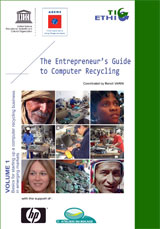Publication of practical guide to computer recycling
24-11-2008 (Paris)

Guide's cover
UNESCO is launching a free practical guide to computer recycling for entrepreneurs and project sponsors, on the occasion of a conference on Digital Solidarity being held in Lyon (France).
UNESCO’s partners in this project are the French Environment and Energy Management Agency (ADEME), French consultants Tic Ethic, non-governmental organizations, Emmaüs Solidarité Ouagadougou and Ateliers du Bocage, along with the United Nations Industrial Development Organization (UNIDO).
The publication of this guide comes amidst growing concern over the impact computer equipment waste on health and environment. According to the International Telecommunications Union (ITU) and the Gartner consultancy, there will be almost 4 billion mobile telephones in use by the end of this year, while the number of personal computers has already passed the billion mark. The good news behind these figures is that the digital divide is shrinking - 58% of computers are in developed countries but, this share is expected to drop to 30% by 2014 when the total number of personal computers should reach two billion. But there is another side to the coin: this year, almost 180 million computers have been replaced by new machines, and an estimated 35 million computers dumped, despite the toxic substances they contain.
The Entrepreneur’s Guide to Computer Recycling is published in English, and will soon also be available in French. The purpose of the guide is to help develop the skills required to handle the growing flux of waste generated by the market for new and used computers so as to protect the environment and public health. This global problem particularly affects developing countries.
The project also aims to support the emergence of new business opportunities. It should prove useful for NGOs and local development stakeholders in fostering small and micro entrepreneurships. In addition, the open license of the guidebook will allow interested parties to create versions adapted to local conditions and particular contexts.
The guidebook, which can be downloaded free of charge (www.ticethic.com/guide), will be supplemented by an operational module containing an inventory of waste recycling processes, practical advice and case studies from recycling plants in Burkina Faso, France and India.
Reuse of obsolete or unwanted IT and computer equipment is the preferred option, rather than destruction. It allows other users to benefit from the equipment at low cost, extends the return on energy and resources used in manufacturing the products and reduces the quantity of devices entering the waste stream. Reuse may require repair, refurbishment or upgrade.
Equipment and components not fit for reuse should be disassembled and processed to recover raw materials in an environmentally sound manner. PCs contain valuable ferrous (e.g. iron), non-ferrous (e.g. aluminium and copper) and precious metals, such as gold, palladium, silver, indium and gallium that can be retrieved. The rising value of raw materials makes recycling more economically viable and attractive.
Internet support will soon be available with a forum on which entrepreneurs will be able to discuss their experiences. Considering that the number of PCs used in China, for example, is expected to rise from 55 million in 2007 to half a billion in 2015, there should be much to discuss.
The publication of this guide comes amidst growing concern over the impact computer equipment waste on health and environment. According to the International Telecommunications Union (ITU) and the Gartner consultancy, there will be almost 4 billion mobile telephones in use by the end of this year, while the number of personal computers has already passed the billion mark. The good news behind these figures is that the digital divide is shrinking - 58% of computers are in developed countries but, this share is expected to drop to 30% by 2014 when the total number of personal computers should reach two billion. But there is another side to the coin: this year, almost 180 million computers have been replaced by new machines, and an estimated 35 million computers dumped, despite the toxic substances they contain.
The Entrepreneur’s Guide to Computer Recycling is published in English, and will soon also be available in French. The purpose of the guide is to help develop the skills required to handle the growing flux of waste generated by the market for new and used computers so as to protect the environment and public health. This global problem particularly affects developing countries.
The project also aims to support the emergence of new business opportunities. It should prove useful for NGOs and local development stakeholders in fostering small and micro entrepreneurships. In addition, the open license of the guidebook will allow interested parties to create versions adapted to local conditions and particular contexts.
The guidebook, which can be downloaded free of charge (www.ticethic.com/guide), will be supplemented by an operational module containing an inventory of waste recycling processes, practical advice and case studies from recycling plants in Burkina Faso, France and India.
Reuse of obsolete or unwanted IT and computer equipment is the preferred option, rather than destruction. It allows other users to benefit from the equipment at low cost, extends the return on energy and resources used in manufacturing the products and reduces the quantity of devices entering the waste stream. Reuse may require repair, refurbishment or upgrade.
Equipment and components not fit for reuse should be disassembled and processed to recover raw materials in an environmentally sound manner. PCs contain valuable ferrous (e.g. iron), non-ferrous (e.g. aluminium and copper) and precious metals, such as gold, palladium, silver, indium and gallium that can be retrieved. The rising value of raw materials makes recycling more economically viable and attractive.
Internet support will soon be available with a forum on which entrepreneurs will be able to discuss their experiences. Considering that the number of PCs used in China, for example, is expected to rise from 55 million in 2007 to half a billion in 2015, there should be much to discuss.
Related themes/countries
· France
· PC Refurbishment
Share this story:
Contact information
- UNESCO Media Advisory N°2008-84
Source














